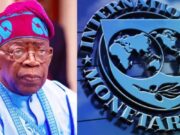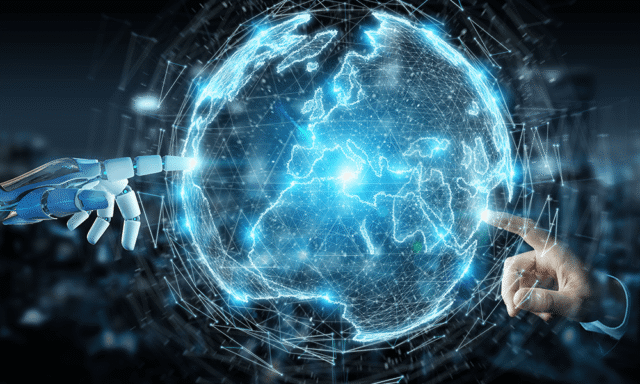In 2025, we’re witnessing an unmistakable transformation globally—Artificial Intelligence is reshaping virtually every sphere of our lives. From healthcare breakthroughs to sweeping economic shifts, here are 10 Ways Artificial Intelligence Is Changing the World in 2025, told with professionals’ insight and human warmth.
Table of Contents
1. Healthcare: Diagnosis, Treatment, and Personalized Care
AI systems now routinely analyze medical scans—X‑rays, MRIs, CT scans—with unprecedented accuracy, flagging anomalies that often evade even expert eyes. They’re turbocharging drug discovery and precision‑tailoring treatment to patients’ genetic profiles, radically improving outcomes. Beyond diagnostics, AI‑powered telemedicine platforms and virtual care assistants support chronic patients remotely. These advances demonstrate how Artificial Intelligence is saving lives and extending care accessibility worldwide.
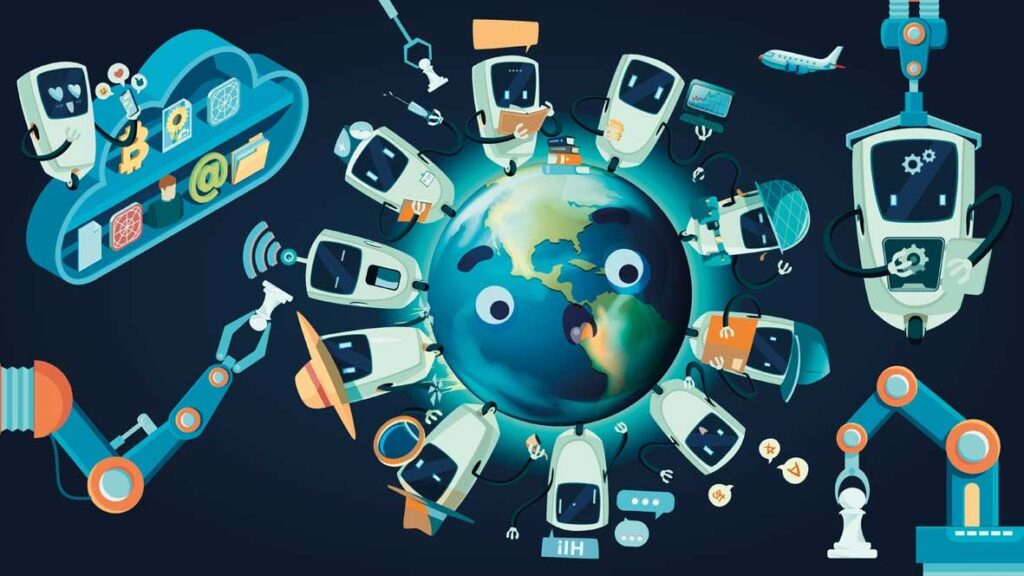
2. The Future of Work: Automation and New Roles
The workplace is evolving fast. Mundane, repetitive tasks—from scheduling to data entry—are now largely handled by intelligent systems, freeing humans for creative and strategic roles. This shift has also sparked demand for entirely new jobs: AI ethicists, AI trainers, explainability consultants, and more. While automation replaces certain roles, it creates others—and workers who adapt and upskill stand to thrive.
3. Smart Cities: Urban Efficiency and Sustainability
City infrastructure is being reimagined with intelligent traffic lights, optimized energy grids, and real-time waste‑management routing. These smart‑city innovations cut congestion, reduce pollution, and streamline public services. As AI systems learn from real-area data, city planners can anticipate and solve issues before they arise—bringing us closer to truly livable, sustainable urban environments.
4. Climate Action and Environmental Monitoring
Artificial Intelligence now plays a central role in climate resilience—predicting floods and droughts, monitoring deforestation and emissions, and improving disaster preparedness. Learning from massive datasets, AI helps policymakers allocate resources more accurately and respond faster. On the innovation side, machine learning aids in identifying novel electrocatalysts for renewable energy storage and optimizing supply chains for sustainability.
5. Research Revolution: Science and Innovation Accelerated
In research environments, AI accelerates hypothesis generation, experiment design, and data analysis. It can rapidly scan literature, model complex systems, and draft scientific reports efficiently. This reinvention of the research process is helping scientists unlock discoveries faster, propelling breakthroughs in fields ranging from genomics to material science.
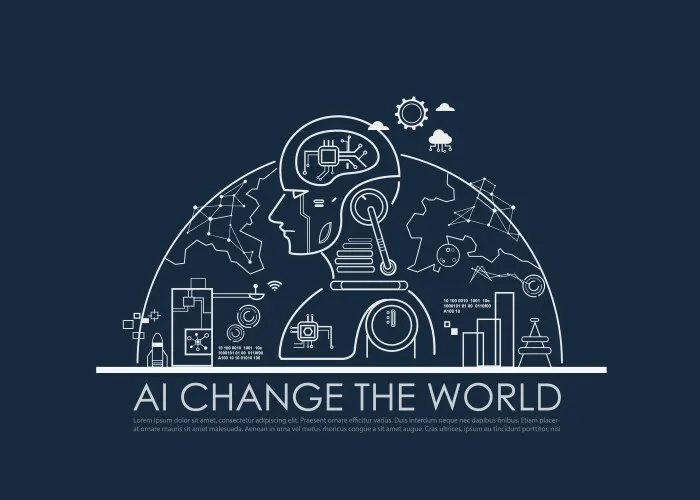
6. Transportation: Smarter and Safer Mobility
Automated vehicles may not be ubiquitous yet, but traffic management using AI is already cutting commute times and pollution. Logistics companies rely on intelligent route planning to reduce oil use and delivery delays. Predictive maintenance powered by machine learning avoids breakdowns before they happen. Combined, these innovations point to safer, greener, more efficient transport networks worldwide in 2025.
7. Personal Assistants: Getting More Personal
Your virtual assistant knows you better than ever—anticipating needs, managing schedules, controlling smart home devices, and making proactive suggestions. Whether it’s recommending content, handling email triage, or adjusting your thermostat, these systems are deeply intuitive companions in everyday life. This level of personalization—based on context, preference, and data—is emblematic of how Artificial Intelligence is joining our routines in silent, powerful ways.
8. Economy and Industrial Investment
Tech giants are investing heavily in AI. In 2025, Google, Amazon, Meta, and Microsoft are spending hundreds of billions building energy‑intensive AI infrastructure. This influx has revitalized sectors like chip manufacturing, cloud data centers, and construction, even amid broader slowdowns. The hard data? AI investments alone could boost global GDP by nearly 15% by 2035. Yet concerns remain over labor disruption, environmental footprint, and economic disparity.
9. Workforce Disruption: The Other Side of Progress
It’s not just about investment—job losses are mounting. Major corporations are cutting entry- and mid-level white‑collar roles, citing AI’s growing ability to generate reports, analyze documents, and write code. Some experts warn AI may eliminate up to 50% of these jobs within five years, raising real concerns over societal impact. The transition is swift, and both policy frameworks and workforce reskilling efforts are racing to keep up.
10. Global Governance: Regulation, Rights, and Treaties
As AI’s influence deepens, governments and international bodies are crafting regulatory guardrails. The EU’s landmark Artificial Intelligence Act came into force in August 2024, setting legal parameters for commercial AI deployment. Meanwhile, more than 50 nations endorsed the Council of Europe’s Framework Convention on Artificial Intelligence aimed at ensuring transparency, fairness, and respect for democratic values. These efforts underscore that the future of intelligent systems depends not only on tech but also on rights-based oversight.
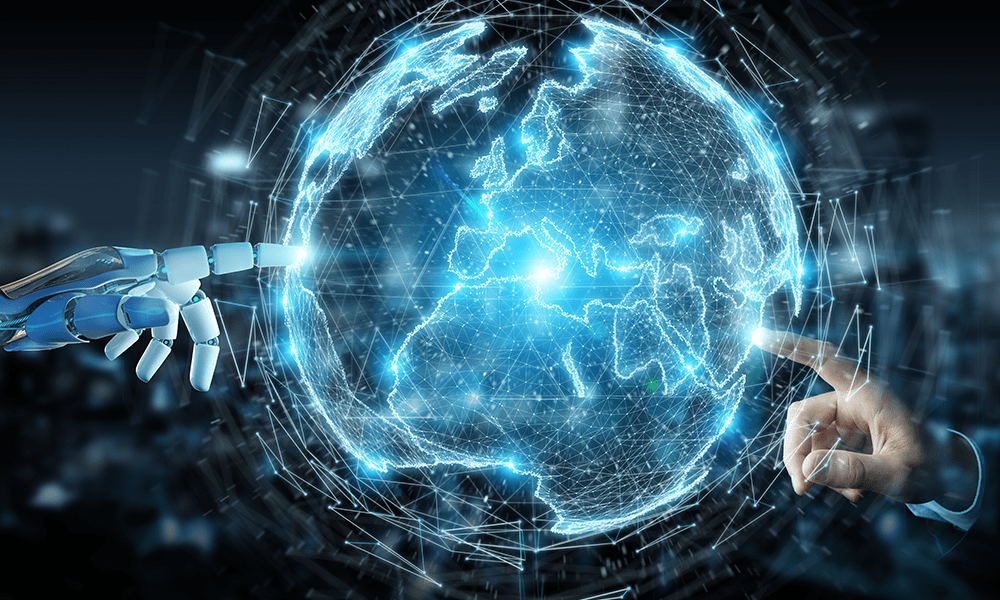
Looking Ahead: A Balanced Future Powered by Intelligence
Through these ten powerful shifts, it’s clear that Artificial Intelligence is more than a buzzword in 2025—it’s a force redefining healthcare, the environment, governance, and daily life. But the transformation isn’t without tension. The promise of productivity and precision comes hand in hand with ethical challenges, inequality risks, and a need for thoughtful regulation.
As we navigate this new era, human values will determine whether AI becomes a tool of abundance or exclusion. For individuals, adaptability—embracing lifelong learning and proactive collaboration with intelligent systems—is key. For nations and policymakers, wise regulation and inclusive frameworks are paramount.
Join Our Social Media Channels:
WhatsApp: NaijaEyes
Facebook: NaijaEyes
Twitter: NaijaEyes
Instagram: NaijaEyes
TikTok: NaijaEyes





